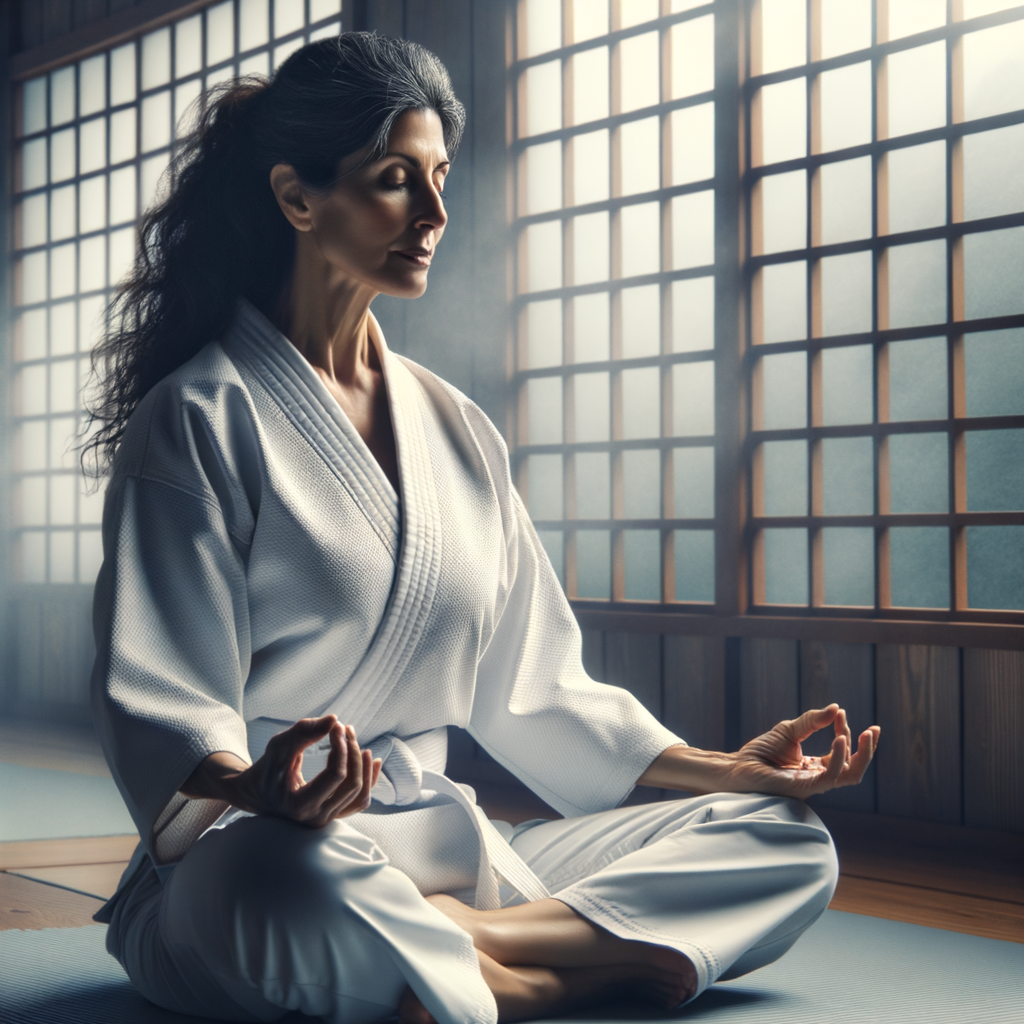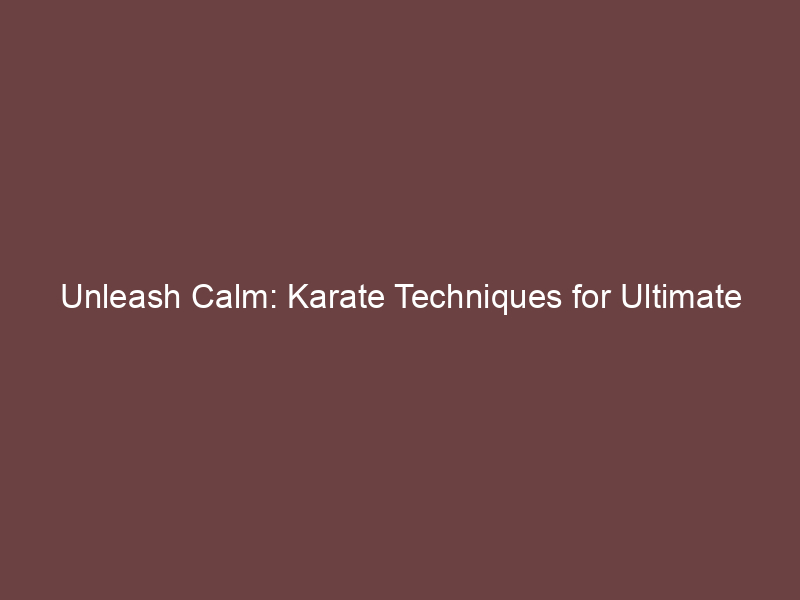
Introduction to Karate Relaxation Techniques
When most people think of Karate, they imagine high kicks, sharp punches, and intense concentration. However, there’s another side to this ancient martial art that often goes unnoticed – its ability to promote relaxation and stress relief. In this section, we will explore the connection between Karate and relaxation, and how this martial art can be used as a stress relief technique.
-
- Understanding the connection between Karate and relaxation
At its core, Karate is a discipline that requires both physical and mental strength. It’s not just about learning how to defend yourself, but also about finding inner peace and balance. The practice of Karate involves a series of movements known as ‘kata’. These movements, when performed correctly, require a high level of concentration and control. This focus on the present moment can help to clear the mind, reducing stress and promoting relaxation.
-
- How Karate can be used for stress relief
Stress is a common problem in today’s fast-paced world. It can lead to a variety of health issues, including high blood pressure, heart disease, and anxiety disorders. Karate can be an effective way to combat stress. The physical exertion involved in Karate helps to release endorphins, the body’s natural mood elevators. Additionally, the focus required to perform Karate movements can take your mind off your worries, helping to reduce stress levels.
Learning Karate is not just about self-defense. It’s also about learning how to control your mind and body, and finding a sense of peace and relaxation in the process. Whether you’re a seasoned martial artist or a beginner, incorporating Karate relaxation techniques into your routine can help you lead a healthier, more balanced life.
In the following sections, we will delve deeper into the benefits of Karate for stress relief and relaxation, providing you with practical tips and techniques that you can incorporate into your daily life.
Stress Relief through Karate
Stress is a common part of life, but it can be managed in many ways. One of these ways is through the practice of karate. But before we delve into how karate can help, let’s first understand what stress is and how it affects us.
Understanding Stress
Stress is a normal physiological response to demands or threats. It can come from any event or thought that makes you feel frustrated, angry, or nervous. Stress is your body’s way of protecting you. When working properly, it helps you stay focused, energetic, and alert. However, beyond a certain point, stress stops being helpful and starts causing major damage to your health, mood, productivity, relationships, and quality of life.
-
- Definition and causes of stress
Stress is a feeling of emotional or physical tension. It can come from any event or thought that makes you feel frustrated, angry, or nervous. Stress can be caused by a variety of factors including work, school, family issues, or major life changes.
- Effects of stress on mental and physical health
How Karate Helps in Stress Relief
Stress is an inevitable part of life, but it doesn’t have to control your life. One of the most effective ways to manage stress is through physical activity, specifically, Karate. Let’s explore how this martial art aids in stress relief.
- The Role of Physical Activity in Stress Management
Physical activity has a direct impact on stress levels. When you engage in physical activity, your body releases endorphins – chemicals in the brain that act as natural painkillers and mood elevators. They create a feeling of happiness, often referred to as the “runner’s high”.
Physical activity also improves your ability to sleep, which in turn reduces stress. Studies show that people who engage in regular physical activity have lower levels of stress and anxiety than those who are inactive.
Now, think about Karate. It’s not just any physical activity. It’s a discipline that requires focus, control, and precision. As you practice Karate, you’re not just moving your body, you’re also training your mind. This combination of physical and mental exercise makes Karate an excellent stress-reliever.
- Specific Karate Techniques for Stress Relief
There are specific Karate techniques that are particularly effective for stress relief. Here are a few:
| Technique | Description |
|---|---|
| Kata | A sequence of movements and techniques that you perform alone. Practicing Kata requires concentration and focus, which can help distract you from your worries and reduce stress. |
| Kumite | Sparring with a partner. This can help you release pent-up energy and tension, which can reduce stress. |
| Meditation | Many Karate classes include meditation at the beginning or end of the class. Meditation can help you clear your mind and reduce stress. |
Karate is not just about fighting. It’s about self-improvement and self-discipline. As you practice Karate, you’ll learn to control your emotions, stay calm under pressure, and handle stress more effectively. So, why not give it a try? It might be the stress relief solution you’ve been looking for.
Martial Arts for Relaxation
While Karate is a popular choice for stress relief, it’s not the only martial art that can help you relax. There are several other martial arts techniques that are known for their calming effects. Let’s explore some of them.
Other Martial Arts Techniques for Relaxation
- Tai Chi:Tai Chi is a Chinese martial art that focuses on slow, controlled movements and deep breathing. It’s often described as “meditation in motion.” Practicing Tai Chi can help reduce stress and anxiety, improve balance and flexibility, and even boost your mood. It’s a gentle exercise that can be done by people of all ages and fitness levels.
- Judo:Judo is a Japanese martial art that emphasizes throws and grappling. While it can be physically demanding, it also requires mental focus and discipline. This combination of physical exertion and mental concentration can help you forget about your worries and feel more relaxed. Plus, the sense of achievement you get from mastering new techniques can boost your self-esteem and confidence.
- Aikido:Aikido is another Japanese martial art, but it’s quite different from Judo. Instead of using force against force, Aikido teaches you to blend with and redirect the force of an attack. This requires a calm and relaxed state of mind. Practicing Aikido can help you develop a more peaceful mindset, which can reduce stress and improve your overall well-being.
These are just a few examples of martial arts that can help you relax. The key is to find a martial art that you enjoy and that suits your lifestyle. Remember, the goal is not to become a world champion, but to improve your mental and physical health.
Comparing Karate with Other Martial Arts
- Similarities and differences in techniques: While all martial arts share a common goal of self-defense, the techniques used can vary. For instance, Karate focuses on striking techniques, such as kicks and punches, while Judo emphasizes throws and grappling.
- Effectiveness in stress relief: Karate, like other martial arts, is an effective stress reliever. The physical exertion and focus required during training can help clear the mind and reduce stress levels.
- Kicks: Karate is known for its powerful and diverse kicks, which are often more emphasized than in other martial arts such as Judo or Aikido.
- Punches: Punching techniques in Karate are precise and forceful, requiring both physical strength and mental focus.
- Blocks: Karate teaches a variety of blocking techniques to defend against attacks, which can be different from the defensive techniques used in other martial arts.
- Kata: Kata, or forms, are sequences of movements practiced in Karate. These forms can be compared to the patterns or sequences found in other martial arts.
- Kumite: Kumite is a form of sparring in Karate. It’s a practical application of techniques learned in Kata, similar to sparring in other martial arts.
- How Karate promotes muscle relaxation: The physical exertion in Karate helps to relax and stretch muscles, promoting overall physical relaxation.
- Improvement in sleep patterns: Regular Karate practice can lead to improved sleep patterns, as physical activity helps to regulate the body’s sleep cycle.
- How Karate improves focus and concentration: The mental discipline required in Karate helps to improve focus and concentration, benefits that are also found in other martial arts.
- Reduction in anxiety and depression: Regular Karate training can help reduce symptoms of anxiety and depression by promoting a sense of accomplishment and improving overall physical health.
- Creating a schedule: Like any regular physical activity, Karate requires a consistent schedule, which can help improve time management skills.
- Setting achievable goals: Karate training involves setting and achieving goals, such as mastering a new technique or earning a new belt, which can boost self-esteem and motivation.
- Personal experiences: Many people find that Karate, like other martial arts, provides a unique and rewarding personal experience that can lead to personal growth and development.
- Results and key takeaways: The results of Karate training can include improved physical fitness, increased self-confidence, and enhanced mental clarity.
- Combining Karate with other stress management techniques: Karate can be combined with other stress management techniques, such as meditation or deep breathing, for a comprehensive approach to stress relief.
- Long-term benefits of Karate for stress management: Long-term benefits of Karate can include improved stress management, increased focus and concentration, and enhanced physical fitness.
- Improvement in self-esteem and confidence: The achievement of mastering new techniques and earning new belts in Karate can lead to improved self-esteem and confidence.
- Development of discipline and self-control: Karate, like other martial arts, requires discipline and self-control, both of which are skills that can be beneficial in daily life.
- Focus on breathing: Karate places a strong emphasis on proper breathing techniques, which can help to improve focus and relaxation.
- Being present in the moment: The focus required in Karate encourages being present in the moment, a skill that can help reduce stress and improve mental clarity.
- Improved physical fitness: Regular Karate training can lead to improved physical fitness, including increased strength, flexibility, and endurance.
- Increased energy levels: Regular physical activity, such as Karate, can help to increase energy levels and promote overall well-being.
- Improved mental clarity: The focus and concentration required in Karate can lead to improved mental clarity and cognitive function.
- Increased mental resilience: The challenges faced during Karate training can help to build mental resilience, improving the ability to cope with stress and adversity.






